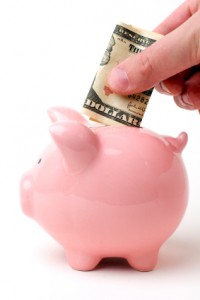 It is never easy to draw up a budget, much less stick to one. And while simply spending less money may sound like a noble idea, it is possibly even more challenging than drawing up that dreaded budget. So, how do you ensure you have a tidy sum stashed away for that rainy day, and that too without the involvement of the B-word?
It is never easy to draw up a budget, much less stick to one. And while simply spending less money may sound like a noble idea, it is possibly even more challenging than drawing up that dreaded budget. So, how do you ensure you have a tidy sum stashed away for that rainy day, and that too without the involvement of the B-word?
Rule 1: Pay yourself first
It doesn’t matter if you are drawing a six figure salary or living paycheck to paycheck, always take 10-20% off the top of every check and deposit in a high yield savings account before paying anyone else – period. This may seem hard, or even pointless, but is infinitely easier than trying to cut down on spending the money you know is lying around. After all, what you don’t see, you can’t miss. If you have a checking account, you can sign up with the automatic savings plans offered by various banks like Ally Bank, [mma bank=’CIT Bank’ alt= ‘CIT Bank’]CIT Bank Savings[/mma] (called AutoSave), [mma bank=’Capital One’ alt= ‘Capital One 360 Savings Account’]Capital One 360 Savings[/mma] (Automatic Savings Plan)AmTrust Direct, and others to have money moved into your savings account every month. An automatic savings plan allows you to specify an amount to be transferred from your checking account to your online savings account on a regular basis. Even if you put away $500 a month, you will have $6,000 before the year is out, not calculating interest.
Rule 2: Lock yourself out of your emergency/retirement fund
This essentially follows the same principal as Rule 1. If it’s easy to access, you’re likely to be tempted to dip into it for situations that may not entirely warrant the title of an emergency. The smarter thing to do is to create a complex password, write it down, and hand over the piece of paper to a trusted friend. Let them know they can’t give it back to you unless you have a REAL emergency: natural disaster, medical emergency, emergency auto repair, emergency insurance costs, or when you lose your job. And always, always remember, that this out-of-reach account will help you to pay the bills during an emergency, without the risk of an over-drawn credit card, or costing you more in interest.
Rule 3: No credit. No credit cards. No loans. No buying on credit. Period. Period.
It will be pointless to have $1,000 in savings and $2,000 in debts. Remember that you will always pay more interest for debt than you will earn interest on savings. Statistics also show that people tend to purchase additional, and more expensive, items while using a credit or debit card. Especially with a credit card, most people tend to forget that the amount they are signing over will have to actually come from their own pockets. On the other hand, there is somehow a reality check when you have to count cold paper bills while making a purchase. So, as far as possible, stick to cash payments.
If you want to get a jump start on your savings, check out the nations best savings account rates.
